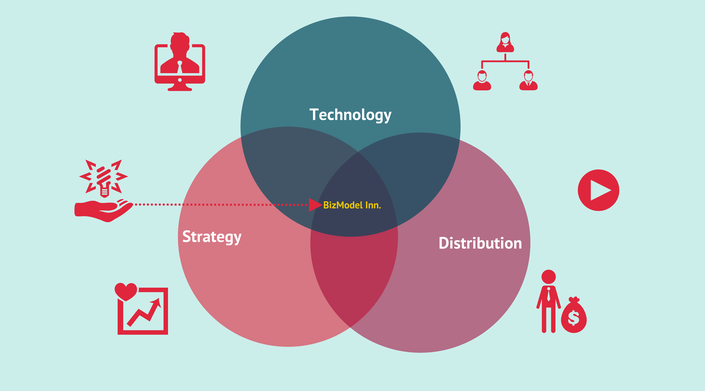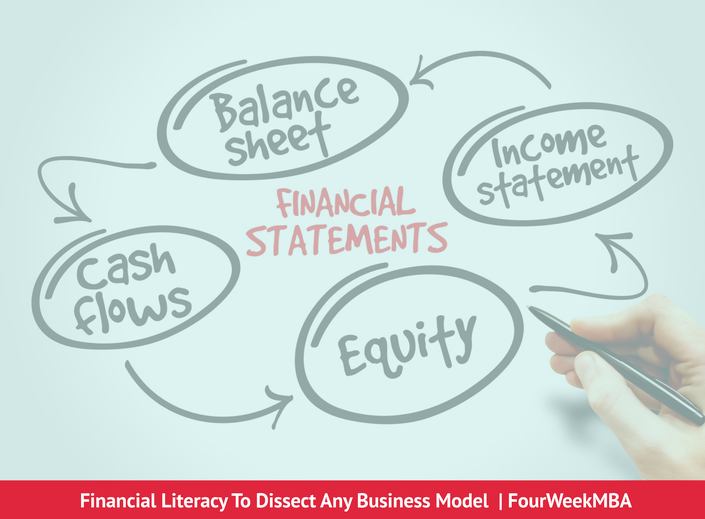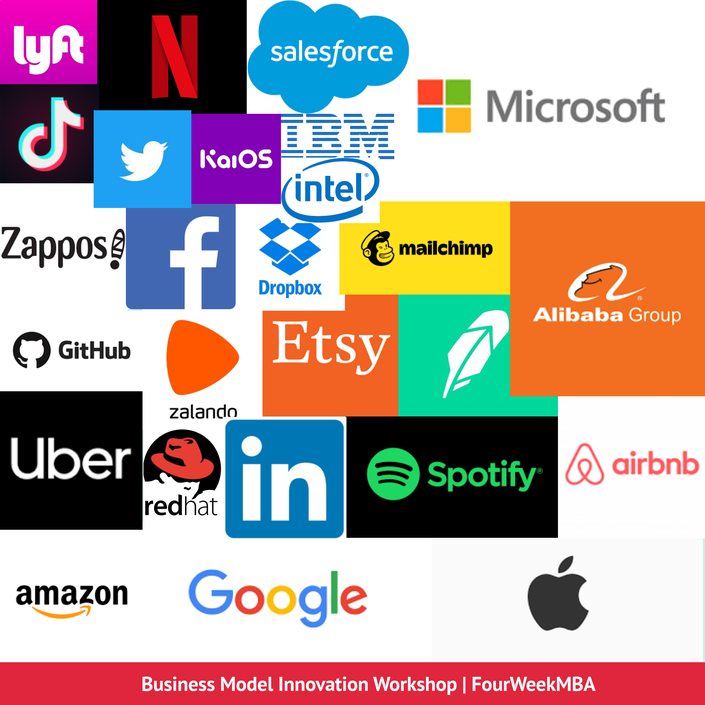Your Go-To Business School
The BizSchool That Bridges The Gap Between The Academic World And The Real World
Featured Courses
Back in 2011, I got my international MBA. I found the program extremely valuable, as I was making a transition from law to finance; and at the same time, I wanted to bridge the gap between the university world and the entrepreneurial world.
On the other hand, I've also found many flaws in the way the MBA is conceived given the changed premises of today's business world. And that is why in 2015, I set to build my own business school. It took me a while to process the way I wanted this business school to look like.
But finally, in 2019, I'm taking this step and launching the FourWeekMBA business school. Why did I do that? Let me explain.
How has the business world changed?
The business world has changed. This might sound a trivial statement. Yet, not so if you go inside most business schools around the world.
The digital world has changed how entrepreneurship works, and it has become critical to understanding those dynamics.
That is why I’m building up the FourWeekMBA Business School. I want to make this platform the go-to place for business students, professionals, executives, entrepreneurs, and aspiring digital entrepreneurs.
What’s going on with higher business education?
An MBA can still be a valuable program for people that want to progress their business career. And for aspiring entrepreneurs. However, there are some aspects of an MBA program that are fundamentally flawed.
As the business world changes at a faster and faster pace, the opportunity cost associated with enrolling in an MBA program has become too high for most people to bear.
That is also why there seems to be a sharp decline in interests for the program:
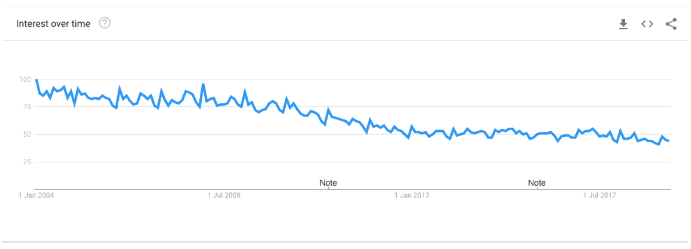
By looking at the data related to MBA enrollments, it seems that in 2018, most top business schools experienced a sharp decline:
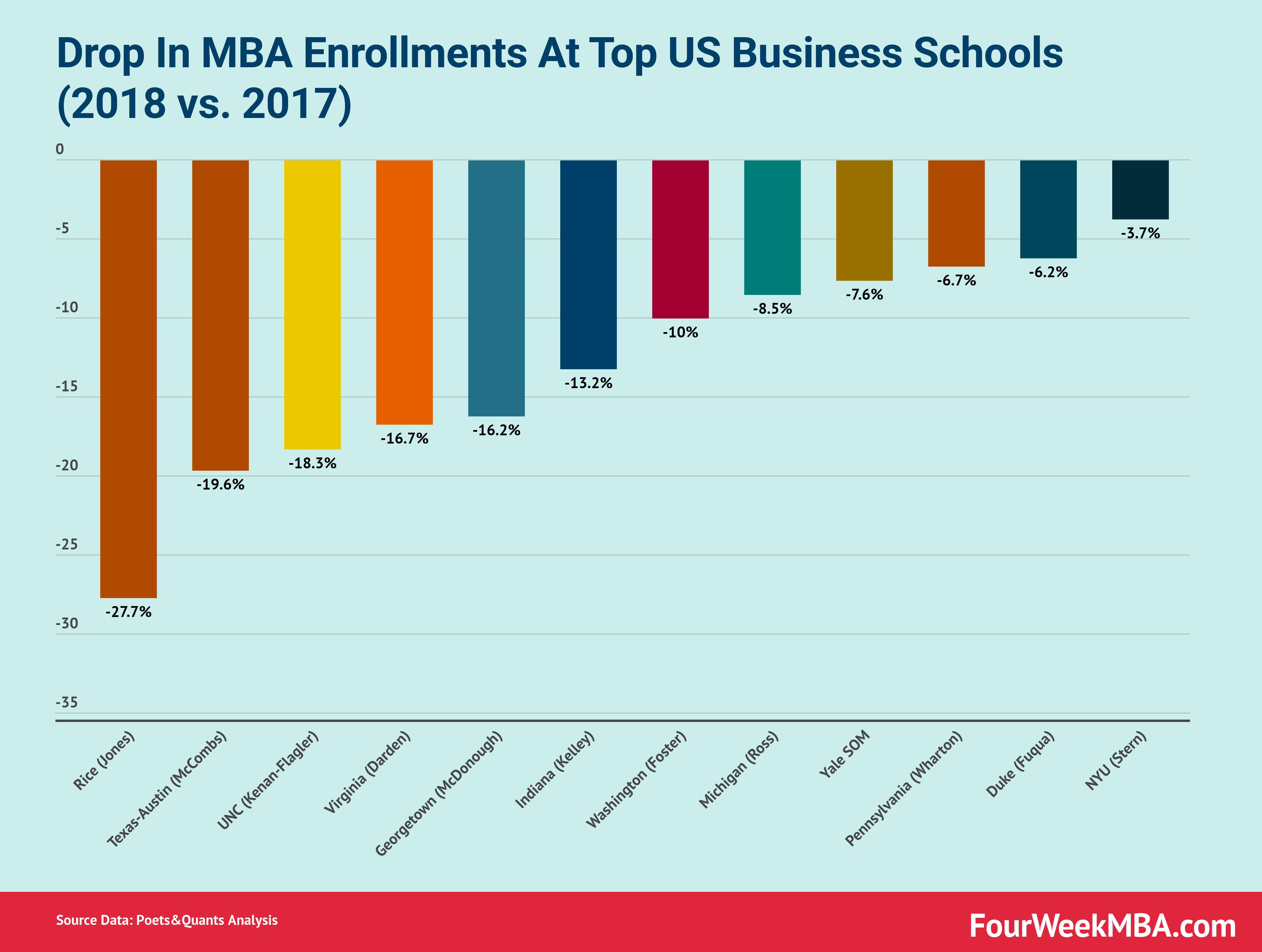
And not even top business schools really make money from MBA programs.
How Harvard Business School really makes money
Most people believe that Harvard Business School primarily makes money from its MBA program (I thought it too). But then I looked at the hard numbers, and I figured a different story:

HBS Financials
While the MBA is one of the largest contributors to HBS revenues, it is not, by far, the main one.

In addition to that, the MBA program itself generates high fixed costs for the school, which makes the program highly unprofitable.
Therefore, when you look at Harvard Business School business model you realize how they need to charge high-tuition, as they need to pay salaries and benefits to professors and academics working at the business school.
In part, this is normal as the academic research process is expensive.
If we were to look at HBS Business School as a company, its MBA actually is a losing business unit.
Indeed, 16% of HBS revenues come from MBA tuitions and fees, 44% of its total expenses go to salaries and benefits, instead. Not all the expenses for salaries and benefits go to the MBA, most of them might do.
Thus, the MBA itself is a model which is not financially sustainable for the school, if it weren't for donations from alumni.
Just to be sure, HBS is an incredible reality, as it manages to still be profitable nonetheless as an educational institution which, in any case, has to finance research.
Thus, HBS really makes money via its publishing arm.
But here comes my point. How valuable is research in the business world?
Technological innovation vs. business innovation
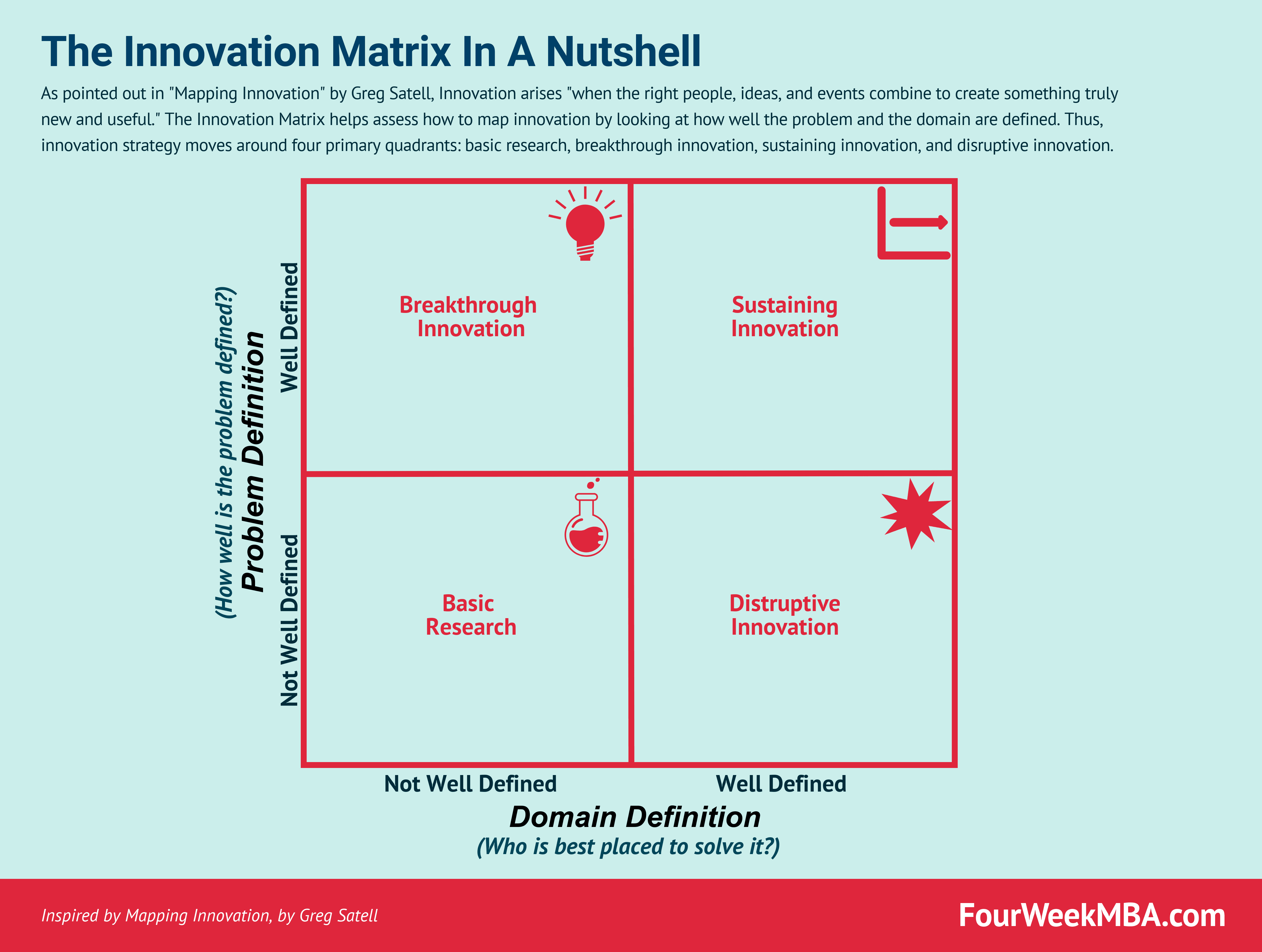
When I interviewed Greg Satell, author of Mapping Innovation. He showed me a simple quadrant could be used to define innovation. The quadrant tells us that when a problem is not well defined, neither its domain, we're in the basic research quadrant.
On the opposite side, when a problem is well defined and so is the domain that is when sustaining innovation happens, and so on.
Now, while when it comes to technology, I agree with this view. When it comes to business, I believe (you can prove me wrong) that most innovation happens in the real world while the role of academia might simply become that of curating and rationalizing tools used already by entrepreneurs.
There is also a problem of wording, as most people today confuse technological innovation with business innovation.
Technological innovation does spur business innovation. Think of how the Internet has enabled a Cambrian Explosion of business models, that disrupted old ones. And how this explosion is still ongoing.
Yet those are two separate concepts and it is important to keep that in mind.
Business innovation happens "outside the building"
However, business innovation primarily happens through business model innovation. And business model innovation doesn't happen in a vacuum. As Steve Blank would put it that happens "outside of the building."
That means academic research in the business context is valuable if it is highly tied to classifying real-world entrepreneurial tools. But as often happens, either the academia is too slow in recognizing the proper value to certain phenomena (as it needs to be rigorous).
Or it lacks the proper incentives to simplify the tools and frameworks for entrepreneurs (academics are rated for the complexity of their ideas, rather than their effectiveness in a real-world scenario).
Entrepreneurship requires focus, experimentation, and a good dose of learning, fast, so that business objectives can be achieved.
When entrepreneurs test assumptions, they don't have to be rigorous or precise. They need estimate and ballpark, well-executed, and tested using the real-world as a lab.
In short, my whole point (which you can agree or not) is that while for other sciences, there might be a clear benefit of research. When it comes to the business world, research might bring little real-world benefits.
Enter the FourWeekMBA Business School Model
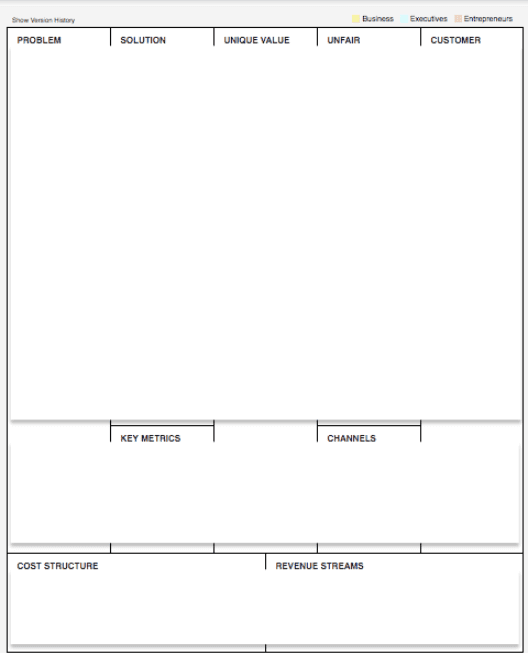
The FourWeekMBA Lean Canvas made with LEANSTACK
Whit these premises I'm starting up the FourWeekMBA Business School.
While I'm not going to tell you how the FourWeekMBA Lean Canvas looks like (hey, that would be like giving you the recipe of my business!). Among the other things, I'll uncover for you - once we open up the Business School - how I managed to build the FourWeekMBA, from strategy to execution.
Here let me tell you a few things about what makes the FourWeekMBA Business School unique and why the vision of building it makes me so excited!
Fueled by passion
After years of trial and errors. The Bud Caddell Diagram suggested how to find the "Hooray" spot:

I had the idea of FourWeekMBA seeding since 2011-12 when I was taking my MBA. But I only started to execute it in 2014-15. At the time though I could not figure out why it didn't take off. I still didn't grasp the reasons why the old business school model was failing.
Only in 2018, after years of trials and errors, and once I took back on track my blog, my vision became clear.
Top business schools all over the world (including top-tier schools like MIT and HBS) referenced the materials from the FourWeekMBA as reading materials to their classes.
That is when I realized I was on the right path.
FourWeekMBA Business Model Story
At this stage, if you really want to appreciate the uniqueness of the FourWeekMBA Business School, the best place to start is its business model story.
Problems: What's wrong with the old Business School model?
I identified six key problems that make the old model extremely vulnerable (there are even more but I stopped to the main ones):
- Entry barriers
- Length
- Cost
- Outdated education
- Real-life expertise issue
- Remote learning
Let me explain!
Entry barriers

Source: ccepted.com/mba/selectivity-index
Even before you can walk in the business school, they'll ask for certificates, high grades. In many cases, the process to get in is stressful and it requires an investment in time, which might be well spent in actual learning and knowledge acquisition to progress your career or grow your business.
You didn't even enter the school, and they ask you certificates like GMAT to confirm that you're smart. But the kind of smartness that you might need in the real world goes well beyond a pre-packaged test, made to measure your intelligence on paper.
Thus, the old model creates entry barriers, so that it can justify its being "selective" and to only enroll the smartest people around to charge high fees.
The model I have in mind doesn't place any entry barrier. The selection won't happen top-down, but it will be driven by survival, where the real world and the ability to actually get extraordinary results will eventually select the best people.
Length: too long for today's fast-pacing world
Up to a decade ago, it might have made sense to invest in a program that kept you out of the job market for at least two years, before going back to the real world.
However, in today's fast-paced world, this means entering the business school to learn tools and frameworks to help you in business. When getting out, though, those same tools and frameworks might be already outdated!
Thus, a new model has to be able to give knowledge and insights that practitioners are currently using.
Cost: too risky for today's ever-changing skillset
Fewer and fewer people can afford dozens of thousands of dollars to enroll in an MBA program. The financial burden (especially in the US) has become unbearable for many students and professionals.
Also, while in the past (up to a decade ago) it made sense, as you could repay the financial investment. Nowadays, the ROI from an MBA is not as clear as it used to be.
Thus, proper business education needs to be priced at 1/10 to 1/100 at the current costs. As we've seen in the HBS case, those high tuition costs need to cover up to fixed expenses, and things like the rental of historic buildings to maintain the prestige of the university, and toward salaries and benefits of academics and professors.
The new model enables us to cut those costs, as it can be provided entirely online and by real-world practitioners, which don't need a salary to survive.
Outdated business education: stuck in the old world
As the business world moves faster, business schools might fall behind and teach things that have become pretty much outdated in the real business world.
That happens because academic knowledge, in business, is finding a hard time to adapt. And while top business schools have the resources and competencies to offer, up to date business education, many others are left behind.
Thus, either you enroll at a top-tier business school, where you get access to the most advanced resources, or you're left out.
The new model proposes an alternative, where people can get access to practitioners that can show the most advanced tools, and frameworks to succeed.
Real-life expertise wanted: let entrepreneurs take the "chairs"
Another key problem the traditional business school model is about mostly employing professors to teach disciplines that require a high degree of experience, rather than just study.
In short, those that today should be teaching, in business, are these practitioners, that really managed to achieve extraordinary results in each field.
In other words, the new model demands business school to be taught by practitioners!
Remote learning, accessible on-demand
The Internet enabled several ways of content delivery that changed education altogether. Two powerful modes of content delivery are on-demand and remote teaching.
A business school fully developed around that gives anyone the ability to learn (no matter where you are) at any time (no time constraints). This is very powerful and still relatively underutilized in business schools.
In short, the new model will create a Netflix effect on business education.
How will the FourWeekMBA business school be different?
Well, at this stage, it feels great to have got so far. However, to finally accomplish the mission of FourWeekMBA, I'm finally building up from scratch the FourWeekMBA Business School.
It will be an online business school, as a substitute for an MBA, with a few key differences:
- practitioners as teachers as a rule of thumb.
- The content will be delivered in several formats (audios, videos, interviews, transcripts, text, and ebooks).
- It will always be accessible on-demand (any time, anywhere).
- No entry barriers, the real world will be your judge.
- You will learn tools and frameworks used by entrepreneurs, practitioners, and executives at top organizations (no theorizing).
The lean multi-staged roll-out of the Business School
I preach what I teach. This is my key principle. That is why I'm building the school by following the lean principles.
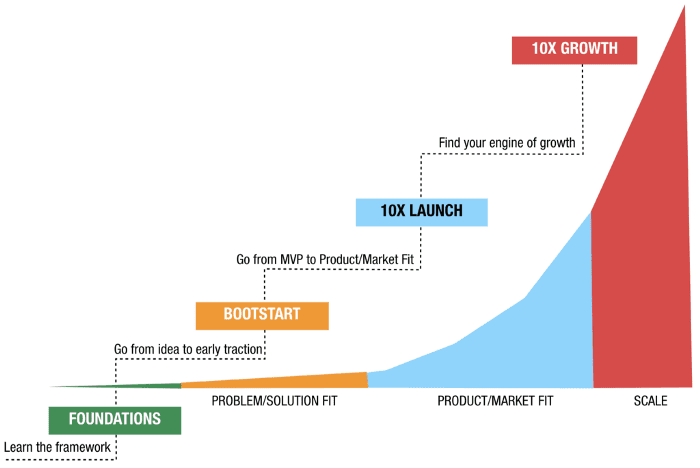
The Traction Model by Ash Maurya, author of Scaling Lean (Source: blog.leanstack.com)
Rather than launch and open the school to an unlimited number of students. I'm following a staged roll-out. Ash Maurya highlights it on Scaling Lean.
In other words, I'll launch the school by following these steps:
- in September 2019, I launched the "Business Model Innovation Workshop," which went sold out after a week. Thus, I passed the Problem/Solution Fit Stage.
- By January 2020, the second step and second staged roll-out will follow a 10x growth path and bring in 10-20x times the number of students I had with the workshop. This will help pass through the Product/Market Fit stage. In other words, before the e-learning platform can scale, it needs to be ready to have a constrained number of students. Only then it will be ready to level up.
- A third stage, in which the Business School might experience the first phase of scale, enrollment might be open a larger number of students. There is no timeline for that as it might happen in six months or in one/two years depending on the feedback of the existing students and the readiness of the platform to deliver to fit the market.
Who is the FourWeekMBA Business School for?
You will benefit from the school if you are in one of the following categories:
- Business school student: you are a student of business at a business school which want to complement the curriculum of the classes taken to get the most out of my MBA, get the highest grades, and a set of resources you'll have for life.
- Business professional: you are a professional in a field that goes from accounting, finance, to sales, marketing or engineering. You're not yet in a managerial role, but you're looking to take that step. The FourWeekMBA Business School will give you the insights and knowledge to step-up your career.
- Aspiring digital entrepreneur or entrepreneur: you are an entrepreneur looking to grow an online business from scratch. Or to actually leverage on an existing business to scale it further. Also, you might be an entrepreneur who is willing to put the effort to understand the digital world, to enhance a more traditional business. The FourWeekMBA Business School will give you the tools, resources, and frameworks to business growth.
- Executive: you are a business professional already in a managerial role, and you're looking to level up your game to bring it to the next level. Thus, you're trying to become a partner of it further. The FourWeekMBA Business School will give you the insights and resources to make it through.
- Analyst: you are an analyst that understands the financial world pretty well. However, you're still missing higher-level business concepts that would help to gain a better understanding of the companies you'll be analyzing so that you can move from pure finance to other fields like venture capital, or private equity. The FourWeekMBA Business School will give you the toolbox to gain a deeper understanding of digital businesses, beyond pure financials.
What disciplines will you learn?
Great business education has to give at least an understanding of the key disciplines needed to run any business.
Those include:
- Financial Literacy
- Financial Analysis
- Business Modeling
- Business Strategy
- Marketing Strategy
- Sales and Marketing
- Distribution Strategy
- Business Development
- Growth Marketing
- And more
Thus the FourWeekMBA Business School will be structured around those disciplines and more.
In addition, it will host over time additional formats like:
- Webinars
- In-depth interviews
- Guides
- In-depth analyses
- Notes
The aim is to give you all you need to succeed in the real business world.
Business model innovation as the centerpiece of the Business School
One of the people that I like to follow the most in the business world, venture capitalist, Fred Wilson, in a recent article, highlighted something that many are still missing today:
I believe business model innovation is more disruptive than technical innovation.That might sound trivial, yet it's not. Most of us believe that technical improvements (what we call technology) are what enabled global changes.
While this is true, there is another component, the business model innovation which caused even more massive changes to our society.
That's because technology enables a new way of doing business. And assumptions that in the past were the basis of doing business, suddenly become outdated.
As Fred Wilson further explained:
The move from desktop computing to the web. We saw massive disruption as we went from a licensed software business model to an advertising-supported business model, which has evolved into an advertising/subscription freemium business model.When new, revolutionary technology finally is widely adopted, that is when a massive phase of business model innovation happens. For instance, we're still looking at how the Internet-enabled the digital economy still ongoing explosion.
We might be looking at a similar change and blossoming of new business models with the advent of the Blockchain and crypto-based business models.
That's why the Business School will be centered around dissecting business models and understanding business model innovation at a deep level.
What do you gain?
From the FourWeekMBA Business School you can expect:
- Career advancement
- Start-up a company
- Grow a company
- Scale-up a company
- Step up from employee to manager
- Level up from executive to partner
- Move onward from analyst to private equity, or venture capital analyst

